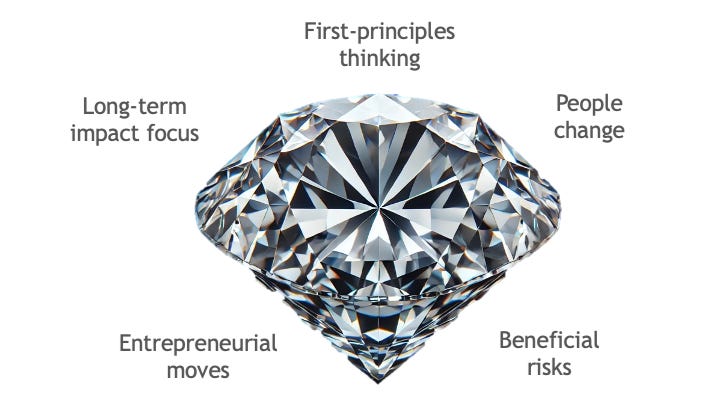How to really create value with your strategy
Dear Strategist,
How does strategy truly create value? It's a simple question with profound implications. Here is my answer:
1. First-principles thinking
You can see it over and over again: Companies struggle if they lack a clear logic of why they succeed, if they do not possess competitive advantage. Especially in tough markets, the low tide wrecks most weak boats.
A clear strategic logic concretely means having convincing answers to typical fundamental questions:
Where do we play? In which markets can and do we want to compete? Which segments are attractive for us, given our position and capabilities?
How to win? What is our competitive advantage? How do we differentiate from competitors in ways that add value for the customer (e.g., cost, quality, speed, adaptiveness)?
What does it take? Where do we need to excel? What capabilities and strategic initiatives are required to win?
How to make money? What are our key profit sources today? What are our key value levers going forward?
Strategy is first-principles thinking. If it does not work in principle, it does not work in practice.
2. Entrepreneurial moves
Some people argue that strategy is about finding new ideas. I don't think this hits the nail.
New insights create value only if they trigger new action. New actions are strategically valuable only when they are substantial new business opportunities.And all substantial business opportunities are bets that require risk taking, making them entrepreneurial.
Thus, strategy is about identifying entrepreneurial moves.
As a consequence, strategy needs to deal with uncertainty of these entrepreneurial actions in a structured way - by identifying and evaluating underlying "what-you-need-to-believes" and by pre-thinking execution variants in order to act more swiftly when entrepreneurial opportunities arise.
3. Long-term impact focus
Everyone knows that focus is a key feature of strategy. Focus creates value in multiple ways:
It clarifies direction, helping coordinate more synergistic action between different parts of the organization
It reallocates resources from legacy businesses towards future opportunities
It ensures efforts matter to clients, not just internally
It helps do the right things, not just doing things right
It defines what to stop doing - via strategic guidelines or "Not-To-Do" lists
Even shorter: Strategy creates focus on what moves the needle.
4. People change
Strategy creates value by making people change.
It creates mindset shifts - understanding how to be successful in the future and how that is different from the past, helping overcome drag and momentum
It creates alignment - resolving internal differences and coordinating action
It creates a change motor - defining and tracking strategic initiatives helps everyone progress on what makes successful long term, and not only be busy with today's urgencies
5. Beneficial risks
This is a tricky one. You do not simply want to reduce risks. No risk - no return.
Risks without significant potential impact can obviously be ignored. Identifying major, i.e., potentially high-impact risks is a typical exercise in most companies.
The easy part is about reducing your company's survival-threatening risk levels. In my experience, that is not a very frequent problem. But it does exist, for example in the case of disruptions.
More relevant, and more difficult is to increase beneficial risks. A beneficial risk has significant upside, not only downside. Even better the profile should be asymmetric - with significant upside, but limited downsides.
To increase beneficial risks, it's important to understand character and dynamics well. Then, you can proactively identify downside-limiting and upside-exploiting actions.
Practical strategy nugget to take away: If you want your strategy to be value-creating, use one of the five levers: 1. Think through first principles, 2. trigger entrepreneurial moves, 3. increase focus, 4. enable people change, and 5. increase beneficial risks.
Which lever will you pull to make your strategy create more value?
Let me know your reactions and thoughts!
Sebastian


